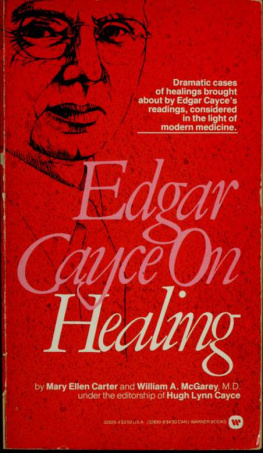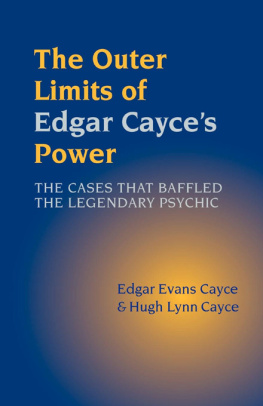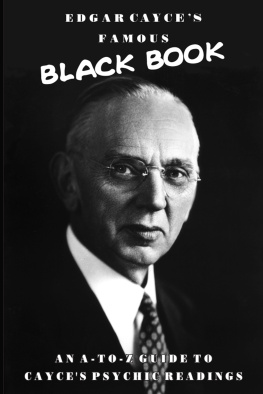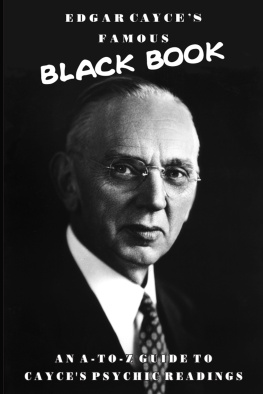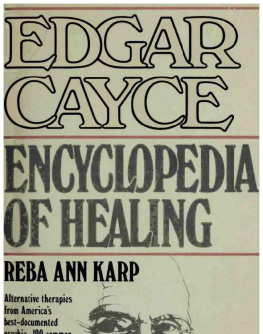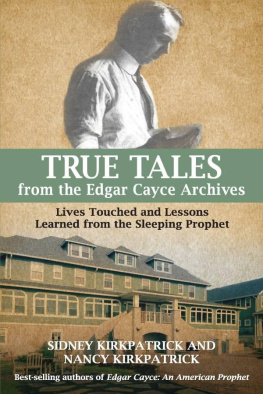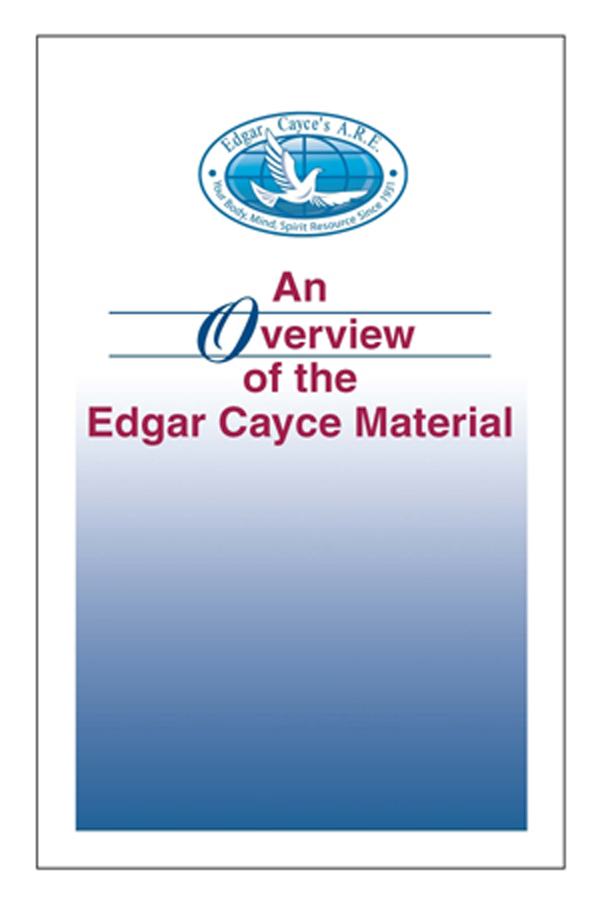An Overview of the Edgar Cayce Material
Kevin J. Todeschi
An Overview of the Edgar Cayce Material
By Kevin J. Todeschi
(Adapted from Edgar Cayces ESP by Kevin J. Todeschi)
Copyright 2005 by the Edgar Cayce Foundation
All Rights Reserved
Edgar Cayce Readings 1971, 1993-2007
by the Edgar Cayce Foundation.
All rights reserved.
Contents
Edgar Cayce: Twentieth-Century Mystic
For forty-three years of his adult life, Edgar Cayce (1877-1945) demonstrated the uncanny ability to put himself into a kind of self-induced sleep state by lying down on a couch, closing his eyes, and folding his hands over his stomach. This state of relaxation and meditation enabled him to place his mind in contact with all time and space. From this state he could respond to questions as diverse as, What are the secrets of the universe? and How can I heal my arthritis? His responses to these questions came to be called readings and contain insights so valuable that even to this day individuals have found practical help for everything from maintaining a well-balanced diet and improving human relationships to overcoming life-threatening illnesses and experiencing a closer walk with God.
Though Cayce died over half a century ago, the timeliness of the material in the readings is evidenced by approximately one dozen biographies and more than 300 titles that discuss various aspects of this mans life and work. These books contain a corpus of information so valuable that even Edgar Cayce himself might have hesitated to predict their ongoing impact upon the twenty-first century. A hundred years ago who could have known that terms such as meditation, Akashic Records, spiritual growth, auras, soul mates, and holism would become household words to millions? Further details about his life and work are explored in such works as There Is a River (1943) by Thomas Sugrue, The Sleeping Prophet (1967) by Jess Stearn, Many Mansions (1950) by Gina Cerminara, and Edgar Cayce: An American Prophet (2000), by Sidney D. Kirkpatrick.
The majority of Edgar Cayces readings deal with health maintenance and the treatment of illness. To this day, individuals continue to find physical help from the Cayce readings. Yet, although best known for this material, the sleeping Cayce did not seem to be limited to concerns about the physical body. In fact, in their entirety the readings discuss over 10,000 different subjects! Even this vast array of subject matter, however, can be narrowed down into a much smaller range of topics. The following five categories are some of the most important covered by the Cayce information: (1) Health-Related Information; (2) Philosophy and Reincarnation; (3) Dreams and Dream Interpretation; (4) ESP and Psychic Phenomena; and (5) Spiritual Growth, Meditation, and Prayer.
Throughout his life, Edgar Cayce claimed no special abilities nor did he ever consider himself to be some kind of twentieth-century prophet. The readings never offered a set of beliefs that had to be embraced, but instead focused on the fact that each person should test in his or her own life the principles presented. Though Cayce himself was a Christian and read the Bible from cover to cover every year of his life, his work stressed the importance of comparative study among belief systems all over the world. The underlying principle of the readings is the oneness of all life, tolerance for all people, and compassion and understanding for every major religion in the world.
The Readings Approach to Health
The information from the readings on health includes simple suggestions about what each of us can do to stay well. The nature of many of these recommendations indicates that Cayces understanding of healthcare was really ahead of its time. These basic health principles include such items as: maintaining a well-balanced diet, the need for regular exercise, the role of attitudes and emotions in achieving and maintaining good health, the importance of relaxation and recreation as part of a balanced lifestyle, and the desirability of keeping the physical body cleansedboth on the inside and on the outside. Cayces approach to staying well had its roots in health maintenance and preventive medicine rather than simply the treatment of illnesses as they arose. He was one of the first individuals in the Western Hemisphere to recommend a nutritious diet consisting mainly of vegetables, fish, and fowl, plus sufficient water each day to promote internal cleansing. Cayce recommended these guidelines and others while much of the country had a diet consisting of great quantities of red meat and starches. Yet Cayces contribution to health and physical well-being was not limited simply to proper diet and regular exercise.
Decades ago, he emphasized the importance that attitudes and emotions play in personal well-being. In support of this idea, clinical medicine has discovered how positive attitudes enhance the healing process. Both Cayce and modern medicine agree that humor and joy play key roles in facilitating wellness. It has also been found that certain kinds of negative attitudes or stresses can lead to illness. For example, Cayces readings suggest that persistent angerconscious or unconsciousmay play a part in the onset of disease.
The Cayce information on health offers important insights into how each of us can stay well. The readings make recommendations for a variety of health concernsfrom acne, diet, hemorrhoids, longevity, and warts to arthritis, cancer, epilepsy, mental illness, and psoriasis. Nearly every condition that existed between the turn of the century and 1945whether it was childbirth, fractures, or a vitamin deficiencyis represented in the files of the Cayce material. Interestingly enough, modern-day research has found that many of the recommended treatments given decades ago by the sleeping Cayce to specific individuals seem to be applicable today on a much wider scale. The information on psoriasis and scleroderma are two of the most notable examples. For both of these diseases, the Cayce regimen involves specific dietary changes, particular spinal adjustments, and other natural remedies and procedures. In recent years, following the Cayce program has helped hundreds of people with these two ailments.
The readings were given between 1901 and 1944, and many were ahead of their time in foreseeing future approaches to healthcare. In addition to insights into energy medicine, the role of attitudes and emotions, and the effects of prayer and spiritual healing, Cayce often saw advances in the way we treat dis-ease. For example, in 1927 he stated that, The day may yet arrive when one may take a drop of blood and diagnose the condition of any physical body, (283-2) and certainly today this is commonplace.
Cayce also saw total health as involving coordination among the physical, mental, and spiritual components of life. Any complete approach to health needed to consider an individuals entire being rather than simply the illness. Because of this concept it has been said that the beginnings of present-day holistic health started from the readings of Edgar Cayce.
The health recommendations in the Cayce files draw upon every aspect of medicine, including allopathic, osteopathic, chiropractic, and naturopathic. Treatment suggestions include everything from massage, exercise and diet to spinal adjustments, physiotherapies, and even surgery. In fact, Cayce proposed that ultimately the many schools of medicine should learn how to work together.
For a person asking for physical help the reading was given much like the others. Cayce would put himself to sleep on his couch while his secretary, Gladys Davis, sat nearby with her steno pad and prepared to write down everything that was said. The one conducting the reading, usually Cayces wife, Gertrude, would give him the proper suggestion for obtaining the information that was needed. For physical readings her suggestion to the sleeping Cayce went something like this:



